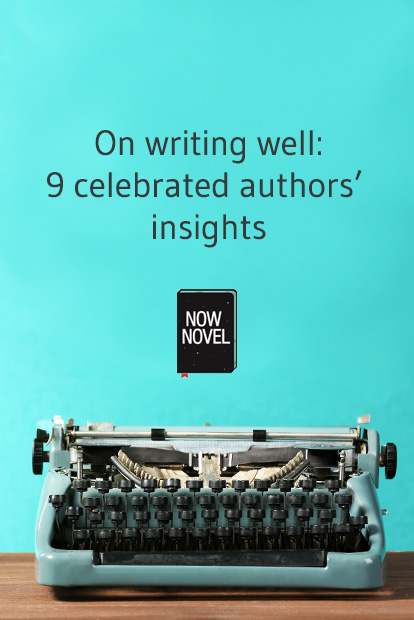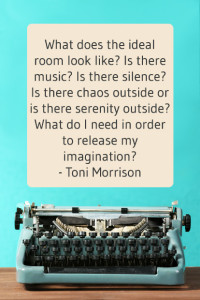All fiction writers want to write well. Here are 9 famous authors on writing well and mastering the art of fiction:
Remember to write for yourself
It can be tempting to be over-anxious about what you imagined audience might think, rather than focusing on what you want to write.
The beloved science fiction author Ray Bradbury always had plenty to say about writing fiction, and he even wrote a book about it, Zen and the Art of Writing. In a 2010 interview with the Paris Review, Bradbury revealed that he didn’t believe good writing could ever come from writing to a particular audience. Furthermore, writing in the service of a particular political cause is also a mistake in Bradbury’s eyes:
‘Every time you write for anyone, regardless of who they are, no matter how right the cause you may believe in, you lie. Steinbeck is one of the few writers out of the thirties who’s still read, because he didn’t write for causes at all. He wrote human stories that happened to represent causes indirectly.’
You might not agree with Bradbury, of course. Also remember that researching whether there is an audience for your book idea before you write is not the same as writing to that audience exclusively. This kind of research simply helps to give you a direction and ensure that your book idea has a place within an established book-buying market.
Have a well-developed setting
Mississippi writer Eudora Welty was known for her fiction that was grounded in the Southern United States. Welty stresses that crafting a convincing sense of place is critical for a writer of fiction:
‘…it’s my source of knowledge. It tells me the important things. It steers me and keeps me going straight, because place is a definer and a confiner of what I’m doing. It helps me to identify, to recognise and explain. It does so much for you of itself. It saves me. Why, you couldn’t write a story that happened nowhere.’
Break the rules
Like Bradbury, Ursula Le Guin has written a classic book on fiction, Steering the Craft. On her website, she argues against two common pieces of writing advice. One is ‘show, don’t tell’:
‘Thanks to ‘show don’t tell,’ I find writers in my workshops who think exposition is wicked. They’re afraid to describe the world they’ve invented… This dread of writing a sentence that isn’t crammed with ‘gutwrenching action’ leads fiction writers to rely far too much on dialogue, to restrict voice to limited third person and tense to the present.’
Le Guin also objects to that other cliché of writing advice, ‘write what you know’:
‘The Brontes are a marvelous example of fictional knowledge, because they show so clearly the relative importance of imagination and experience. Patrick O’Brian is another. I don’t think he ever sailed in a three-master.’
Know when to set work aside
Among the rules Zadie Smith listed in her piece on writing well for The Guardian is this simple reminder that the incubation period between drafts remains important:
‘Leave a decent space of time between writing something and editing it.’
This allows you to approach your draft with fresh eyes, so that errors or awkward phrases your eyes and ears have become accustomed to will stick out more, enabling you to fix them.
Give your characters goals
Kurt Vonnegut reminds writers that one important aspect of writing well is making sure that all the characters have aims. This helps to ensure that your story’s characters are active rather than passive:
‘Every character should want something, even if it is only a glass of water.’
A cast of characters who are not merely props to fulfil or thwart your main characters own desires will give your story depth and create multiple possible identifications for the reader.
Avoid clichés
According to the British writer Martin Amis, ‘Literature is a war against clichés.’ Amis goes on to say:
‘Whenever you write ‘the heat was stifling’ or ‘she rummaged in her handbag,’ this is dead freight.’
Amis describes this as ‘heard writing, heard thinking and heard feelings.’ In other words, the writer is relying on the observations and language that have been made and used to death rather than their own. Writers must discover their own ways of seeing, hearing and describing things in order to write well.
Make the reader feel
Ernest Hemingway had more to say about using your own observation rather than those of others in conveying emotion to readers. This is one place where ‘show, don’t tell’ is good advice. According to Hemingway:
‘I found the greatest difficulty, aside from knowing truly what you really felt […] was to put down what really happened in action; what the actual things were which produced the emotion that you experienced.’
In other words, don’t tell us ‘He was sad.’ Show us why he was sad.
Tell stories about people
Stephen King also believes in writing from observing life keenly. People do no always behave as expected. Writing is not just about getting the prose right. Writers must write about the way people really behave. In his afterword to Full Dark, No Stars, he writes:
‘For writers who knowingly lie, who substitute unbelievable human behaviour for the way people really act, I have nothing but contempt. Bad writing is more than a matter of shit syntax and faulty observation; bad writing usually arises from a stubborn refusal to tell stories about what people actually do — to face the fact, let us say, that murderers sometimes help old ladies cross the street.’
For fiction to be credible, engrossing and surprising it should have grey areas and contradictions just as life does.
Find your ideal writing time, space and rituals
Toni Morrison says that she originally began writing first thing in the morning so that she could work before her children got up, but over time, it became habit:
‘… Eventually I realised that I was clearer-headed, more confident and generally more intelligent in the morning. The habit of getting up early, which I had formed when the children were young, now became my choice. I am not very bright or very witty or very inventive after the sun goes down.’
She also was surprised to discover that she had a writing ritual:
‘I always get up and make a cup of coffee while it is still dark—it must be dark—and then I drink the coffee and watch the light come […] And I realised that for me this ritual comprises my preparation to enter a space that I can only call nonsecular […] Writers all devise ways to approach that place where they expect to make the contact, where they become the conduit, or where they engage in this mysterious process…’
The Nobel-winning author also relates how she instructs her students on writing well:
‘I tell my students one of the most important things they need to know is when they are their best, creatively. They need to ask themselves, What does the ideal room look like? Is there music? Is there silence? Is there chaos outside or is there serenity outside? What do I need in order to release my imagination?’
On avoiding bad writing
Writers can also be opinionated on what constitutes bad writing and have never hesitated to criticise one another. Here are a few examples:
- Marilyn “Clover” Adams said of Henry James, ‘He chews more than he bites off.’ Clearly, his dense prose style did not appeal to her.
- Gertrude Stein famously wrote that ‘A rose is a rose is a rose,’ but not everyone was convinced. According to Wyndham Lewis, ‘Gertrude Stein’s prose-song is a cold black suet-pudding.’
- Mary McCarthy was no fan of J.D. Salinger: ‘That last thing isn’t a novel anyway, whatever it is. I don’t like it. Not at all. It suffers from this terrible sort of metropolitan sentimentality and it’s so narcissistic. And to me, also, it seemed so false, so calculated.’
- Few today would agree with Ralph Waldo Emerson’s scathing criticism of Jane Austen: ‘Miss Austen’s novels . . . seem to me vulgar in tone, sterile in artistic invention, imprisoned in the wretched conventions of English society, without genius, wit, or knowledge of the world. Never was life so pinched and narrow. The one problem in the mind of the writer […] is marriageableness.”
Quotes by writers such as these can also help you remember that there is no type of writing that appeals to absolutely everyone. Nearly every writer has their own set of tips on writing well, and sometimes, the pieces of advice given by different writers will contradict one another. One way to tease out the best advice from writers is to look at how often certain types of advice recur. One writer may insist that it is necessary to do a detailed outline while another may swear by writing to discover what happens, but most writers agree that attention to detail, strong powers of observation and dedication to some form of writing process are crucial to success.
By reading other writers’ descriptions of what they believe is the key to writing well, you can develop your own set of guidelines to steer you in your own work.
Having your work critiqued is a crucial part of how to write a book that readers find well-written. Try Now Novel Groups and get feedback on your writing.




3 replies on “On writing well: 9 celebrated authors’ insights”
Thanks very much, I really enjoyed the advice from authors you put together. Most made helpful points. Except I couldn’t help raise my brows at the fact Martin Amis feels “she rummaged in her handbag” is cliche and that we all need to find different ways to write things. I’ve read too may long-winded complex substitutions for simple language that obscure the story when writers try to find a “new way” to say something. Sometimes simple and to-the-point is best.
Thank you Lexa, I’m glad you enjoyed this. I completely understand what you’re saying – I suppose it’s a matter of developing a sense for what sounds good to the ear and reads smoothly for the eye. What’s interesting is that writers have such differing perspectives on these details of craft.
I suppose the point is that if one simply wrote “she rummaged in her handbag” without a second thought and feel it’s adequate, then it shows a lack of engagement with one’s writing. Martin Amis isn’t exactly one to put things tactfully where if he could do so in a blunt but incisive response manner. In a way, the “simple and to-the-point” style of Hemingway, Cormac McCarthy is a result of what Amis calls “[discovering] their own ways of seeing, hearing and describing things”.
I’m not defending Amis, just extracting what I believe is the point behind the short quote.